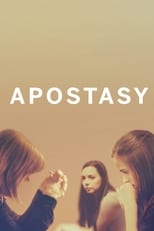Stephen Campbell
May 14, 2019
7/10
Powerful film-making
It is not wrong to be loyal to the righteous and just God of the Bible. He tells us that he will accept "in his holy mountain" only those who walk faultlessly, practice righteousness and speak truth (Ps. 15). If, though, a Christian were to throw in his lot with a wrongdoer who has been rejected by God and disfellowshipped, or has disassociated himself, that would be as much as saying "I do not want a place in God's holy mountain either." If the elders saw him heading in that direction by regularly keeping company with a disfellowshiped person, they would lovingly and patiently try to help him to regain God's view (Matt. 18:18; Gal.6:1). They would admonish him and, if necessary, "reprove him with severity." They want to help him remain "in God's holy mountain." But if he will not cease to fellowship with the expelled person, he thus has made himself "a sharer (supporting or participating) in the wicked works" and must be removed from the congregation, expelled.
- "Disfellowshiping: How to View It"; The Watchtower Announcing Jehovah's Kingdom (September 15, 1981)
one of the biggest things that happened to me was going to college. Suddenly, people were asking for my opinion on things. That was a new concept for me as a Witness. At the Kingdom Hall, if you were asked questions, it was an opportunity to say what was already there in the Watchtower.Similarly, speaking to The Guardian, he states,
I went to college, and that was the key, really. People would ask my opinion on something, and I would be scrambling round trying to find an answer in a text somewhere – because that's what life as a Witness is like. It's group thinking based on the interpretation of a text.Likewise, speaking to Screen International, he explains,
I was harbouring doubts since I went to college. I realised that people at college were interested in your opinion. That was a new concept to me because being a Witness it was always about reaffirming the text, group-think, it wasn't about encouraging independent thought.Another important theme is even more implicit – likening Witnesses to Scientology. This is never overtly addressed, but Kokotajlo's presentation of how Witnesses deal with certain issues unquestionably draws parallels with how Scientologists deal with those same issues. This is perhaps most obvious in how the film depicts disfellowship, emphasising that the family of someone who has been disfellowed must cut off contact with them. This is virtually identical to the notion of "suppressive persons" in Scientology, and in his Irish Times interview, Kokotajlo states,
that's representative of what a lot of Witnesses have to go through. Family members are forced to shun other family members.Looking at the film in a more aesthetic sense, an interesting stylistic device is how Kokotajlo presents characters talking to Jehovah. Although they speak aloud, the people around them don't hear what they're saying (think of a soliloquy on a crowded stage in Shakespeare). This essentially positions the viewer as Jehovah – just like Him, we are in a position to hear what others cannot. Indeed, on a couple of occasions, this positioning of the viewer is foregrounded even more, as characters speak direct-to-camera. It's a daring move, but one which is extremely well handled, unifying form and content. The film is undeniably bleak, but never melodramatic, in its depiction of the conflicts that can arise when a family dynamic is in diametrical opposition to Witness doctrine. However, a vital point is that whilst the film is highly critical of the closed-off nature of the religion, the rules and regulations, and the unfulfilled prophecies, it depicts very humanised characters. In relation to this, Kokotajlo told The Irish Times,
one of the aims of the film was to treat the Witnesses with a lot of respect … I have a lot of compassion for the people within the religion. It's the rules that the organisation creates that I have an issue with. Not the people trying to navigate those rules.Along the same lines, the acting is exemplary, which each of the three leads evoking both sympathy and derision at different points. That the viewer can empathise with a staunch fundamentalist such as Ivanna is testament both to Finneran's nuanced performance and Kokotajlo's compassionate screenplay. The story obviously comes from a place of respect; this is not an arbitrary and/or sarcastic hit-job written by someone who is bitter about their time in the religion, but is instead a presentation of how Witness dogma can affect the people on the ground. Dogmatic proclamations from on-high are all very well and good, but what happens when they clash with the everyday? This is essentially what the film is about, and Kokotajlo handles it brilliantly. From a directorial point of view, he keeps things simple and functional. The lack of budget works for the narrative, as Kokotajlo shuns any kind of directorial gymnastics in lieu of a pseudo-documentarian approach to the material, with the influence of people such as Anthony Asquith, Terrence Rattigan, and Ken Loach unmistakable. In this sense, Oldham comes across as a very real and lived-in neighbourhood, as opposed to an abstract society which feels like it doesn't exist beyond the parameters of the text. All things considered, this is strong filmmaking; in equal measure emotive without being apologist, and informative without being condemnatory – not an easy balance to pull off by any means.
